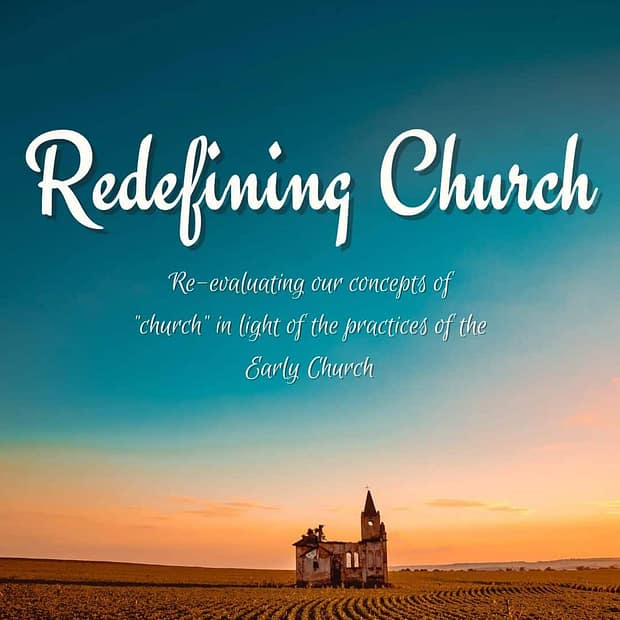Following Peter’s first preach on the Day of Pentecost, the fellowship of believers in Jesus Christ, which would come to be called “the early church” exhibited devotion to the teaching of the Apostles regarding Jesus.
They didn’t have Bibles from which to read, and there were no formal doctrinal statements, but these first believers were united in their devotion to the teaching of the Gospel of Jesus Christ that the twelve apostles shared with them.
What does it mean to be devoted in this way, and what lessons can we take from the way that the early church operated?
Read: Acts 2:42
All the believers devoted themselves to the apostles’ teaching, and to fellowship, and to sharing in meals (including the Lord’s Supper), and to prayer.
The early church didn’t have many of the problems that the twenty-first-century church has. There was no arguing over doctrine or theological differences between different denominations and affiliations. Divisions and differences came as the church grew and spread across continents. Still, at the very beginning, there seems to have been a kind of unity that fostered community and belonging. Everyone was on the same page, as it were.
The word that the NLT translation of the verse translates as “devoted” is the Greek word proskarteréō, which means “to endure; to continue steadfastly with someone; to cleave faithfully to someone”. The word is also used metaphorically to refer to steadfastness and faithfulness in the outgoings of the Christian life, especially in prayer. It is a word that carries with it that sense of unity (or devotion) that the early believers displayed.
A More Simple Faith
The new believers respected and looked faithfully to the twelve apostles to teach them the gospel truth of the life, death, and resurrection of Jesus Christ. They were hungry for knowledge of Jesus and looked to the apostles to feed their hunger. This is evidence of their devotion to the teaching of the gospel.
These first believers didn’t have the resources that we have and take for granted. The New Testament didn’t exist at this point; it would be several decades before the first Gospels were written down and Paul’s letters were written. The only resource for knowledge available to them was the disciples who had walked with Jesus during His ministry on earth.
The early believers trusted the eyewitness accounts of the miracles, the parables, the crucifixion and the resurrection. They didn’t question whether the apostles’ teaching were theologically and doctrinally sound. There was no need to argue over interpretations and translations. They were devoted to the gospel truth that would transform the way they lived their lives and give them access to eternal life with God.

Modern Resources reduce our devotion to the teaching of the Gospel
In the twenty-first century, the simplicity of the earliest believers’ devotion to the teaching of the apostles has been lost in a cacophony of doctrinal and theological debates. We have access to the Gospel in the form of the New Testament, and the internet has opened up the world of academic theology to everyone, with Bible Study tools and numerous different translations and commentaries accessible with a click of a mouse.
We have never had more resources than we have now, but rather than deepen our faith, this unlimited access causes division and disunity – the polar opposite of what the early church experienced. Theological commentaries seem to carry more weight than the Gospel message itself, and amateur theologians question the interpretations of the preachers.
The Gospel, like Jesus Himself, is the same yesterday, today and tomorrow. Yet, you could walk into several different churches from different denominations and find, however slight, differences in doctrinal interpretation of the Gospel that is meant to foster unity, not division. There’s certainly a lack of devotion to the teaching of a singular doctrine or gospel!
Recapturing Devotion to the Teaching of the Gospel of Jesus Christ
To redefine the church for the twenty-first century, there is a need to return to the simplicity of the devotion to the teaching of the apostles that the earliest believers demonstrated. A house that is divided cannot stand, and the body of believers in the twenty-first century has never been more divided than it is now.
Doctrinal debates over the course of two millennia have muddied the waters so that the Gospel has become a cause of conflict – something which it was never meant to be. The future of the church lies in stripping away the layers of interpretation and recapturing the devotion to the teaching of the Gospel that the early church thrived on.
The Eight Concepts of Redefining Church (Quick Links)
- Concept 1: Devotion to the Teaching of the Gospel of Jesus Christ
- Concept 2: Devoted to Fellowship
- Concept 3: Devotion to Breaking of Bread and Prayer
- Concept 4: Togetherness
- Concept 5: Real Community and Sharing
- Concept 6: All-Encompassing Faith
- Concept 7: With Glad and Sincere Hearts
- Concept 8: Praise God

Acts is so eyeopening for how the church should function! I like reading about how their DEVOTION was rewarded with miraculous acts by the Holy Spirit.
It’s so crazy to think that they didn’t have Bibles or formal doctrine. I sometimes forget this, ya know. But they had full faith and serves faithfully, while some in today’s culture struggle to even believe. We are so blessed to have the Word of God and to be able to learn from it!! Loved this article and the breakdown 🙂